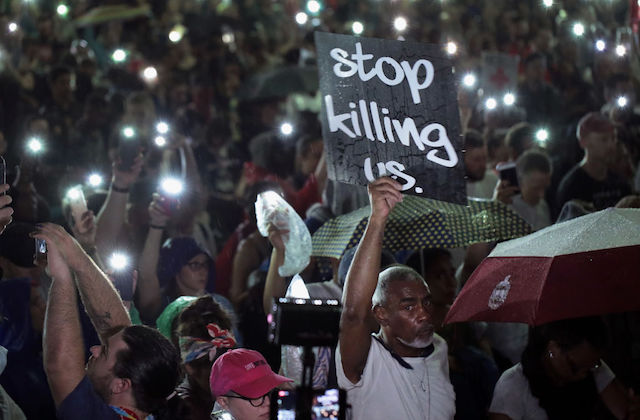On Friday (September 15), former St. Louis Metropolitan Police Department officer Jason Stockley was acquitted on first-degree murder charges for killing 24-year-old Anthony Lamar Smith following a car chase. The judge said that he wasn’t convinced that the White officer didn’t act in self defense, despite the fact that Stockley reportedly said, “going to kill this (expletive)” before stopping the car and the fact that a gun found in Smith’s vehicle had Stockley’s DNA on it, but not the Black victim’s.
Organizers and activists have been in the streets since Friday, protesting the verdict and the system that produced it. Among the crowd: Nicole D. Nelson, a staff attorney with nonprofit civil rights law firm ArchCity Defenders. And as she writes in an op-ed published in The New York Times today, there is nothing new under the sun when it comes to the city’s treatment of its Black residents.
Nelson begins “When Will Black Lives Matter in St. Louis?” by connecting the current unrest with the protests that happened after a police officer fatally shot Black teen Michael Brown and his body was left on the street in nearby Ferguson for 4.5 hours. Then she explains the situation on the ground:
Around noon on Friday, my colleagues and I, along with other protesters, were marching peacefully through the streets of downtown St. Louis when we saw the police department bringing in hundreds of officers in riot gear. In an ostentatious show of force, they lined up along the street to face us, holding their shields and batons aloft so protesters could clearly see them.
To say that these actions were unnecessary and exaggerated would be an understatement. They were clearly intended to make protesters fearful and to provoke unrest.
Demonstrations continued over the weekend and more than 80 people were arrested. By Sunday night, as I and other lawyers and advocates worked to bail out protesters, stories were flooding in about the unscrupulous methods officers were using to engage protesters and ultimately arrest them. Officers had shot rubber bullets into crowds of people, hitting pedestrians and innocent bystanders. Some who took off running to escape the onslaught of rubber bullets were chased and tackled by officers. Videos have since surfaced all over social media that substantiate protesters’ accounts of police in riot gear cornering protesters and refusing to let them leave and go home, which resulted in numerous arrests.
As if this weren’t problematic enough, St. Louis police officers were heard chanting, “Whose Streets? Our Streets!” This is a vile appropriation of a familiar chant that courageous demonstrators used in Ferguson. Can you imagine hearing police officers say those words as they advance on a crowd of protesters?
Nelson goes on to discuss how this behavior is supported by the city’s leadership, as the police chief and mayor provided statements that seemed to value property over the lives of Black people:
At a news conference, Lawrence O’Toole, the acting police commissioner for the city of St. Louis, proclaimed that “police owned tonight.” This is the kind of “leadership” that forces people of color and poor people into survival mode in this region.
In addition, our local officials lament the property damage that has occurred here, but not the grievances of the Black community. On a Twitter post, Mayor Lyda Krewson labeled protesters alleged to have committed property damage downtown as “criminals.” Her and Mr. O’Toole’s willingness to speak out so emphatically against people who break windows, but not against police officers who kill citizens, is enraging for those of us in the Black community and for our allies.
Nelson closes by urging local leadership to heed the policy recommendations of The Movement for Black Lives, including demilitarizing law enforcement, putting an end to the cash bail system and decriminalizing poverty. “Until then,” she writes, “St. Louis law enforcement officials will continue to find themselves locked in this pattern, wondering why Black citizens take to the streets demanding that the police stop killing us.”
Read the full essay here.
